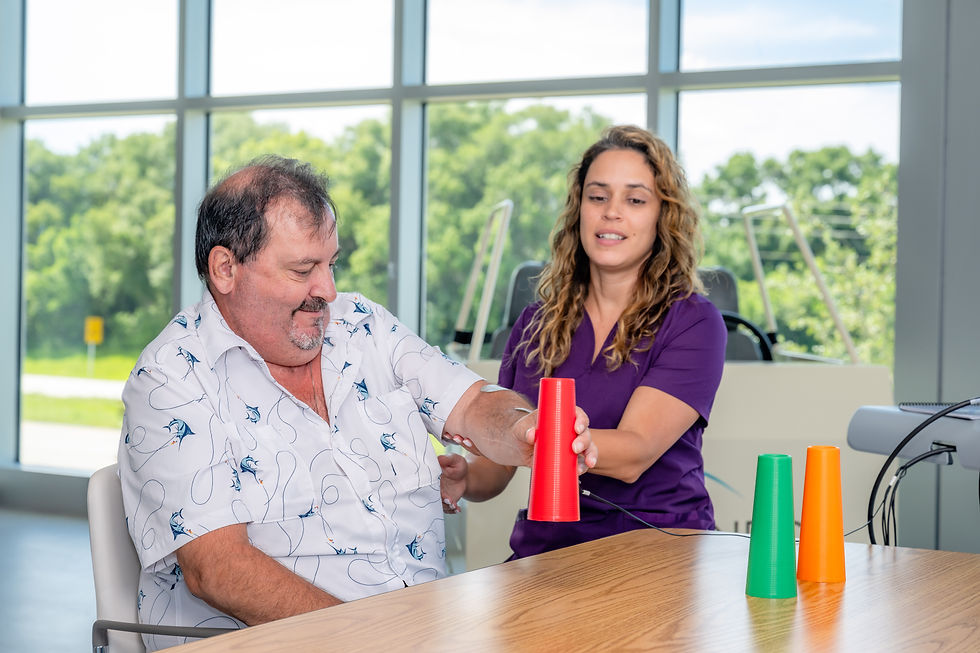Skilled Nursing Facility vs Inpatient Rehab
- Shreveport Rehabilitation Hospital

- Apr 19, 2021
- 3 min read
When a person suffers from a stroke, a traumatic injury, or debilitating disease, a state-of-the-art rehabilitation program makes all the difference when it comes to restoring function and helping the patient achieve optimal health. Choosing the right hospital or facility can be a daunting task. In order to determine the best option for the patient, it’s important to understand the difference in care offered during recovery. Let’s discuss the main differences between a skilled nursing facility and inpatient rehab hospital.
It’s easy to see why people get confused when comparing inpatient rehab facilities and skilled nursing facilities. Both inpatient rehab facilities and rehab hospitals focus on rehabilitative and recuperative care with the goal of helping patients to restore maximum function and regain independence. You can expect the following to be offered at both skilled nursing facilities and inpatient rehab:
Rehabilitation Nursing
Rehabilitation Therapies (Physical, Speech, Occupational)
Audiology
Orthotics
Social and Psychological services
Orthopedic Rehabilitation
Both skilled nursing facilities and inpatient rehab hospitals offer a team approach to care, however they do differ mainly in the intensity of their care and rehabilitation treatments that are offered. Inpatient rehab hospitals focus on acute care, offering a higher level of rehabilitation following traumatic injuries like surgeries such as amputations. Patient’s in inpatient rehabilitation receive daily rehab therapies, for at least three hours a day for up to five days a week.
Skilled nursing facilities offer subacute rehabilitation, which is similar but less intensive as rehab you will find in an inpatient rehab hospital. For example, a patient at a skilled nursing facility may only meet with their occupational or respiratory therapist three times a week for an hour per session. A patient at an inpatient rehab hospital may be moved to a skilled nursing facility once they no longer require the acute care offered at the inpatient rehab hospital but are still not ready to return home.
Not only do rehab hospitals offer more options for care, but studies have backed up what we already see in our acute rehab hospital setting.

Studies Show Inpatient Rehab Works
A new study released by the American Medical Rehabilitation Providers Association (AMRPA) shows that patients treated in inpatient rehabilitation hospitals and units had better long-term clinical outcomes than those treated in nursing homes. The study is the most comprehensive national analysis to date examining the long-term outcomes of clinically similar patient populations treated in inpatient rehabilitation hospitals and units or nursing homes. Lets look at some of the key finding of this study below:
Over a two-year episode of care, inpatient rehabilitation hospital and unit patients clinically comparable to skilled nursing facility patients, on average:
Returned home from their initial hospital rehab stay two weeks earlier
Remained home nearly two months longer
Stayed alive nearly two months longer
Of patients treated:
Inpatient rehabilitation hospital and unit patients showed an 8 percent lower mortality rate than skilled nursing facility patients
Inpatient rehabilitation hospital and unit patients showed significantly fewer hospital readmissions than skilled nursing facility patients
Inpatient rehabilitation hospital and unit patients made 5 percent fewer emergency room visits per year than skilled nursing facility patients
These better clinical outcomes were achieved by inpatient rehabilitation hospitals and units for only an additional cost of $12.59 per day. Let’s take a look below on how Medicare can assist in your stay in an inpatient rehab hospital.

Does Medicare coverage differ at an inpatient rehab vs skilled nursing facility?
Medicare coverage does differ between the two facilities. Although it’s important to discuss the details of each person’s coverage individually, there are some general rules that apply:
Medicare pays for 90 days per stretch in an inpatient rehab hospital, with the first 60 fully covered.
An inpatient rehab hospital requires no pre-qualifying hospital stay for Medicare coverage.
In a skilled nursing facility, Medicare pays for 100 days per stretch, with the first 20 days fully paid for under certain conditions.
A skilled nursing facility requires a 3-day pre-qualifying hospital stay for Medicare coverage.
There are other criteria and requirements for Medicare coverage, and it’s important for each individual to discuss the details of their case with the insurance provider or Medicare service representative.
For patients who have transitioned out of the hospital but are not ready to return home, Shreveport Rehabilitation Hospital offers a comfortable, therapeutic environment and a wide range of acute rehab services. Each patient at Shreveport Rehabilitation Hospital receives high-quality care from a team or providers dedicated to helping them reach optimal levels of independence in the shortest time possible. For more information on programs and services give us a call today to learn more.











